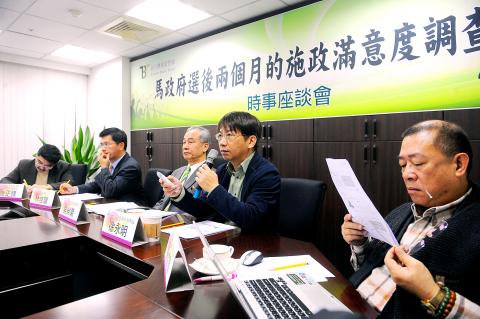President Ma Ying-jeou’s (馬英九) approval rating has plummeted to its lowest level since the aftermath of Typhoon Morakot in 2009 amid recent controversies over US beef and avian flu, a recent poll showed.
Only 26.1 percent of respondents said they were satisfied with Ma’s performance, with 62.1 percent disapproving of the president, the survey conducted by Taiwan Brain Trust think tank on Wednesday and Thursday showed.
Those figures were the lowest since August 2009, when Ma’s approval ratings dropped to 16 percent after his handling of Morakot, the deadliest typhoon in Taiwan’s history, which killed hundreds of Taiwanese, the think tank said.

Photo: Wang Min-wei, Taipei Times
“The numbers signal a crisis for the Ma administration and, as you can see, the situation is getting worse,” Democratic Progressive Party (DPP) Legislator Lin Chia-lung (林佳龍) said.
Responses to almost all the questions asked in the survey were unfavorable to Ma. More than half of respondents said they were unhappy with his performance over US beef imports, the H5N2 avian flu outbreak, rising commodity prices and tax reform.
On the recent US beef controversy, 54.8 percent of respondents questioned Ma’s integrity, because he pledged not to lift the ban on the growth additive ractopamine during the election campaign. A total of 67.7 percent disapproved of the government’s conditional lifting of the ban.
When asked about the alleged cover-up of an avian flu outbreak, 54.1 percent of respondents said they believed that government agencies had deliberately concealed information and 73.8 percent said the government’s handling of the outbreak was unacceptable.
These results suggest two problems in the Ma administration — lack of integrity and incompetence, Lin said.
Shih Cheng-feng (施正鋒), a professor at National Dong Hwa University, said Ma’s role in the recent controversies reflected a serious flaw in Taiwan’s Constitution.
At the beginning of his term in office, Ma was able to sit in the Presidential Office and do nothing, while claiming to be simply -fulfilling a role regulated by the Constitution, whereas he now “seems have his hands on everything” and is ignoring the Executive Yuan, Shih said.
According to the survey, Ma’a approval ratings never exceeded 40 percent after May 2009, one year after he took office.
Shih also highlighted the implications of answers to one of the survey questions, namely that 76.6 percent of respondents believed that public health was more important than relations with the US.
“It appears to me that people are more hostile to the US than they were and the Ma administration is going to have to work even harder to mend relations with Washington in the future,” he said.
Shih also said that former DPP chairperson Tsai Ing-wen (蔡英文), an experienced negotiator on trade issues who is familiar with international affairs, should have been playing a more prominent role for the DPP during the recent controversies over US beef and avian flu.
The survey, which collected 1,116 samples and had a margin of error of plus or minus 3 percent, also found that 53.1 percent of respondents were not satisfied with the new Cabinet led by Premier Sean Chen (陳冲).

SECURITY: As China is ‘reshaping’ Hong Kong’s population, Taiwan must raise the eligibility threshold for applications from Hong Kongers, Chiu Chui-cheng said When Hong Kong and Macau citizens apply for residency in Taiwan, it would be under a new category that includes a “national security observation period,” Mainland Affairs Council (MAC) Minister Chiu Chui-cheng (邱垂正) said yesterday. President William Lai (賴清德) on March 13 announced 17 strategies to counter China’s aggression toward Taiwan, including incorporating national security considerations into the review process for residency applications from Hong Kong and Macau citizens. The situation in Hong Kong is constantly changing, Chiu said to media yesterday on the sidelines of the Taipei Technology Run hosted by the Taipei Neihu Technology Park Development Association. With

CARROT AND STICK: While unrelenting in its military threats, China attracted nearly 40,000 Taiwanese to over 400 business events last year Nearly 40,000 Taiwanese last year joined industry events in China, such as conferences and trade fairs, supported by the Chinese government, a study showed yesterday, as Beijing ramps up a charm offensive toward Taipei alongside military pressure. China has long taken a carrot-and-stick approach to Taiwan, threatening it with the prospect of military action while reaching out to those it believes are amenable to Beijing’s point of view. Taiwanese security officials are wary of what they see as Beijing’s influence campaigns to sway public opinion after Taipei and Beijing gradually resumed travel links halted by the COVID-19 pandemic, but the scale of

A US Marine Corps regiment equipped with Naval Strike Missiles (NSM) is set to participate in the upcoming Balikatan 25 exercise in the Luzon Strait, marking the system’s first-ever deployment in the Philippines. US and Philippine officials have separately confirmed that the Navy Marine Expeditionary Ship Interdiction System (NMESIS) — the mobile launch platform for the Naval Strike Missile — would take part in the joint exercise. The missiles are being deployed to “a strategic first island chain chokepoint” in the waters between Taiwan proper and the Philippines, US-based Naval News reported. “The Luzon Strait and Bashi Channel represent a critical access

Pope Francis is be laid to rest on Saturday after lying in state for three days in St Peter’s Basilica, where the faithful are expected to flock to pay their respects to history’s first Latin American pontiff. The cardinals met yesterday in the Vatican’s synod hall to chart the next steps before a conclave begins to choose Francis’ successor, as condolences poured in from around the world. According to current norms, the conclave must begin between May 5 and 10. The cardinals set the funeral for Saturday at 10am in St Peter’s Square, to be celebrated by the dean of the College